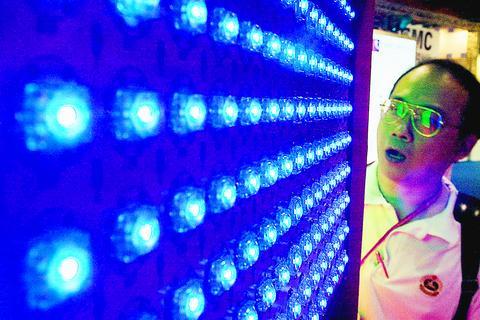The Taipei International Electronics Spring Show, or Taitronics Spring, and the Taipei International Optoelectronics Show kicked off at the Taipei World Trade Center yesterday. The five-day shows, which opened to the public yesterday afternoon, saw a drop in exhibitors and visitors from last year, but there were plenty of interesting gadgets to see among the components, chips, cables and machinery.
"This year there are fewer people than last year," said Hsu Wei-guang (徐偉光), sales manager at Harvest Technology Group (豐禾科技), a manufacturer of small flat-screen televisions for cars and trucks. "There are certainly a lot fewer overseas visitors. I think it is because of SARS."

PHOTO: CHU PEI-HSIUNG, TAIPEI TIMES
Foreign exhibitors dropped by 72 percent on the first day of the show yesterday compared to last year, according to organizers the China External Trade Development Council (CETRA). Only 263 braved the show this year compared to 962 last year.
Exhibitors were nevertheless upbeat.
"I have met lots of new customers and have been very busy," said David Cheng (
Another exhibitor, however, said she had met some foreigners.
"It's been quite busy," said Maggie Tsai (
Tsai is looking for large retailers and shopping channels to market her products. Visitors to the show can snap up the "Dreamate" sleep-aid for NT$3,300.
Last year more than 30,000 visitors to Taitronics Spring saw electronics and flat-panel products from 550 exhibitors in 1,065 booths. This year that figure dropped to 400 exhibitors in 700 booths.
Although touted as an international show, Taitronics Spring attracted only 2,614 foreign buyers last year, which was a record, according to CETRA. The nation's largest exhibition -- Computex Taipei -- attracts more than 20,000 visitors from overseas.
Other smart devices include a wireless panic button on a key ring that can be activated discreetly during a bank raid. A firm press with two fingers on either side of the device alerts a central office or police station of a security breach.
"This system is very popular," said Leo Chen (
Travelers who need to recharge their mobile phones but don't have a plug adapter for their electric charger will welcome a battery charger from Li Ling Co (
Last year, electronics exports topped US$48 billion, according to CETRA. Taiwan makes 39 percent of the world's computer displays, 49 percent of all notebook computers, and 58 percent of all PC cameras, CETRA figures show.
In addition to components and electronics, three competing digital television service providers jostled for position on the show floor.
Multimedia on Demand from Chunghwa Telecom Co (
"We're here mainly because the competition is here," said Kent Ma (
The show runs through Tuesday. Tickets cost NT$200 at the door.

POWERING UP: PSUs for AI servers made up about 50% of Delta’s total server PSU revenue during the first three quarters of last year, the company said Power supply and electronic components maker Delta Electronics Inc (台達電) reported record-high revenue of NT$161.61 billion (US$5.11 billion) for last quarter and said it remains positive about this quarter. Last quarter’s figure was up 7.6 percent from the previous quarter and 41.51 percent higher than a year earlier, and largely in line with Yuanta Securities Investment Consulting Co’s (元大投顧) forecast of NT$160 billion. Delta’s annual revenue last year rose 31.76 percent year-on-year to NT$554.89 billion, also a record high for the company. Its strong performance reflected continued demand for high-performance power solutions and advanced liquid-cooling products used in artificial intelligence (AI) data centers,

SIZE MATTERS: TSMC started phasing out 8-inch wafer production last year, while Samsung is more aggressively retiring 8-inch capacity, TrendForce said Chipmakers are expected to raise prices of 8-inch wafers by up to 20 percent this year on concern over supply constraints as major contract chipmakers Taiwan Semiconductor Manufacturing Co (TSMC, 台積電) and Samsung Electronics Co gradually retire less advanced wafer capacity, TrendForce Corp (集邦科技) said yesterday. It is the first significant across-the-board price hike since a global semiconductor correction in 2023, the Taipei-based market researcher said in a report. Global 8-inch wafer capacity slid 0.3 percent year-on-year last year, although 8-inch wafer prices still hovered at relatively stable levels throughout the year, TrendForce said. The downward trend is expected to continue this year,

Vincent Wei led fellow Singaporean farmers around an empty Malaysian plot, laying out plans for a greenhouse and rows of leafy vegetables. What he pitched was not just space for crops, but a lifeline for growers struggling to make ends meet in a city-state with high prices and little vacant land. The future agriculture hub is part of a joint special economic zone launched last year by the two neighbors, expected to cost US$123 million and produce 10,000 tonnes of fresh produce annually. It is attracting Singaporean farmers with promises of cheaper land, labor and energy just over the border.

US actor Matthew McConaughey has filed recordings of his image and voice with US patent authorities to protect them from unauthorized usage by artificial intelligence (AI) platforms, a representative said earlier this week. Several video clips and audio recordings were registered by the commercial arm of the Just Keep Livin’ Foundation, a non-profit created by the Oscar-winning actor and his wife, Camila, according to the US Patent and Trademark Office database. Many artists are increasingly concerned about the uncontrolled use of their image via generative AI since the rollout of ChatGPT and other AI-powered tools. Several US states have adopted